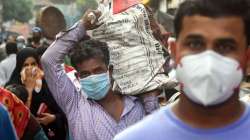Lockdown: More shops to open but no relaxation in containment zones in Delhi; Coronavirus cases rise to 2,625
The Delhi government on Saturday decided to implement the Centre's guidelines on the opening of the neighbourhood and stand-alone shops during the lockdown but said no activity will be allowed in containment zones, as the number of coronavirus cases rose to 2,625 in the national capital.

The Delhi government on Saturday decided to implement the Centre's guidelines on the opening of the neighbourhood and stand-alone shops during the lockdown but said no activity will be allowed in containment zones, as the number of coronavirus cases rose to 2,625 in the national capital.
According to the health bulletin of the Delhi government, 111 fresh cases were reported. With one more fatality, the death toll due to coronavirus reached 54. There are 1,702 active COVID-19 cases in Delhi.
The number of containment zones rose to 95 in the national capital.
There was also a significant drop in the number of recoveries. Only 12 patients recovered on Saturday, the lowest since April 17 when 21 people were discharged from different hospitals.
A day after the Centre issued guidelines to relax the lockdown curbs, the Delhi government said it will implement the directions on opening of neighbourhood and stand-alone shops including those selling mobile phones, garments and stationary items.
Sources in the Delhi government, however, said shops in coronavirus containment zones will remain shut and no activity will be allowed in such areas.
Stand-alone shops and those in residential areas will open with social-distancing norms strictly followed, they said.
However, shops located in market places and malls will continue to remain shut till May 3 in the national capital, as mentioned in the guidelines issued by the Ministry of Home Affairs, the sources said.
Shops other than those dealing in essential items remained shut on Saturday in most areas. Before the Delhi government's order to relax norms, many shopkeepers sought more clarity on the MHA's order.
Asked if allowing additional shops to open was a prudent decision given that the coronavirus cases in the national capital crossed 2500-mark and more areas were added to containment zones, sources said the Delhi government had to take this decision as people had started opening their establishments in several areas after they heard about the latest MHA guidelines.
Asking them to down the shutters resulted in a law and order situation in some areas, they said, adding the Delhi government did not have any option but to implement the MHA's guidelines.
"However, no activity will be allowed in containment zones,” a source said.
According to the MHA's guidelines issued late Friday, the shops will be functioning with 50 per cent workforce and adhere strictly to precautions which include social distancing and wearing masks.
The Union Home Ministry also said malls, liquor and cigarette shops and sale of non-essential items through e-commerce platforms continue to remain shut.
Restaurants, hair salons and barber shops will not be allowed to open as these render services and do not fall under the shop category.
Meanwhile, Dr S K Sarin, chairman of the Delhi government's committee on combating COVID-19, suggested that the ongoing lockdown will have to be continued till mid-May for the epidemic curve to flatten.
Delhi government had announced a lockdown in Delhi on March 23 followed by a nation-wide lockdown by the Centre from midnight of March 24 till April 14. The lockdown was further extended to May 3 by the Centre.
"India is still on the ascending limb of the epidemic curve and so, to ease the restrictions will mean the cases will multiply uncontrollably. And, Delhi has a large number of containment zones, so it will be wise to extend it," Sarin said.
“The lockdown will have to be extended till May 16 as that is when the epidemic curve is likely to start declining, which happens after the flattening of the curve," he suggested.
Amid the lockdown, it was a subdued first day of Ramzan as people stayed indoors.
Religious places including mosques have been closed for nearly a month now. And with clerics advising all to stay home and social distancing becoming the norm, people are unable to get together for prayers and Iftar, a ritual of breaking fast every evening, that are a key part of Islam's holiest month.
"There is a festive mood on Ramzan as people throng the markets and the mosques have increased footfall. But all this is missing this time due to the lockdown and people are keeping indoors," said Burhanuddin, a resident from Lal Kuan in the walled city.
The eateries and shops in old city areas including Chandni Chowk and the neighbourhood of Jama Masjid are usually teeming with not only those observing Roza, but also with food lovers from other parts of the city.
But only a few shops were open in these areas on Saturday.
"Due to restrictions of lockdown most of the shops are closed. There is also confusion regarding opening shops in the evening hours," Burhanuddin said, adding, "I hope the government will relax the lockdown restrictions so that people do not face hardships in buying food".